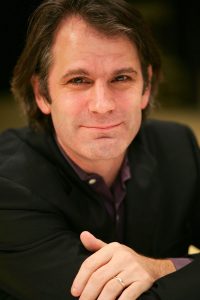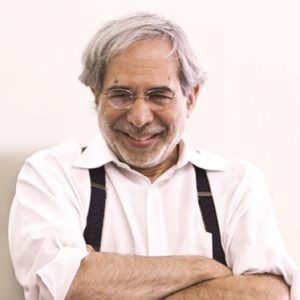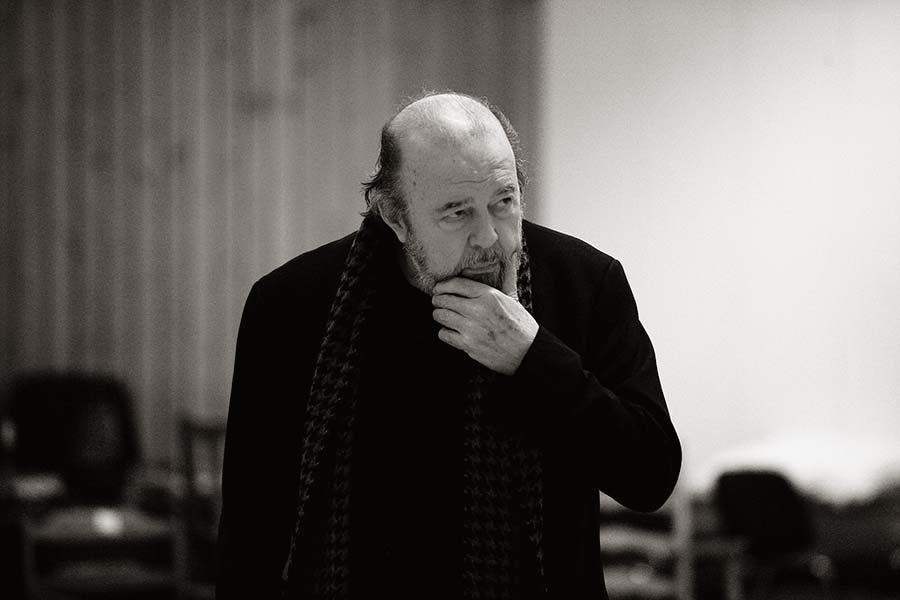Sir Peter Hall, the towering English director who founded the Royal Shakespeare Company and the National Theatre, died on Sept. 11, 2017. He was 86.

I found myself walking across Waterloo Bridge on my way to a rehearsal at the National Theatre in London when I saw on its famous advertising sign the simple words: “Sir Peter Hall, 1930-2017.” I stopped, slightly breathless; it was a simple and clear thing. Peter had died, and we lost one of our great leaders and one of the most generous theatre artists of the last 100 years.
Founder of the Royal Shakespeare Company, builder of the great National Theatre itself, tireless champion of the arts and artists, wizard and magician of language and the deeper music of Shakespeare and Mozart and text of any kind, and raconteur of gigantic proportions, he blazed through a life in the theatre.
I only slipped into his orbit for several months as an associate on his productions of Measure for Measure and A Midsummer Night’s Dream at the Ahmanson in Los Angeles in 1998. I learned more in those short months than in any time in my life—not just an extraordinary tutelage in language, but more importantly a lesson in how to deeply think about theatre, how to be courageous, how to be generous, and how to defend the work and all of the artists who struggle to make it. I entered the journey hopeful; I left transformed.
And I was one of many. After he died, the outpouring of stories and expression of his work in people’s lives became as transforming as he was. He singlehandedly reinvented, reconnected, re-explained the idea of company and company work, and what it meant not only to the individuals who made it but to his own country and its political leaders, as he fought tirelessly to build artistic homes and an idea of what this work should be. All of us in the theatre, whether in England or U.S., grow up to discover the ideas that Peter Hall almost singlehandedly invented about what a life in the theatre could be and where we could make it, and how it could be extraordinary.
My fondest memory of Peter is when his then 17-year old daughter came into rehearsal to watch him work. His love for her and his deep joy in his family, including his wonderful wife, Nicki, his daughter, Emma, and his brilliant son, Ed, were the most exquisite side of him.
“My daughter, Rebecca, is going to be a star,” he said. And I am not sure, even though it turned out to be true, that he meant it in terms of success. He meant it in almost a poetic, Spenserian way; she just shone that brightly to him.
I have to be honest in saying I barely made it across Waterloo Bridge that day. Mostly because I knew, like many people, that I was going to work in such a special place because of Peter. The day was long but full of joy as I celebrated his incandescent spirit in the work and the place he made with so much heart. In Spenser’s “The Faerie Queene,” there is a line describing the “maple’s inward sound.” That was Peter: the deepest inward sound.
Bartlett Sher, director
The Master Builder

In 1968, at the age of 22, I was an actor training at London Academy of Music and Dramatic Art. A primary reason I had come to LAMDA was the Royal Shakespeare Company, the theatrical powerhouse Peter Hall had founded in 1961 at age 30. The RSC challenged the status quo, was artistically adventurous, political, and animated by a vibrant resident ensemble of directors, actors, and designers who interpreted a mix of Shakespeare, classical, and contemporary plays. For the RSC, Peter’s 1963 adaptation with John Barton of Shakespeare’s histories as The Wars of the Roses, and his 1965 staging of Hamlet with David Warner, along with the world premieres of Pinter’s plays, were legendary. At the RSC under Peter, Shakespeare felt modern. The actors performed classics with a spontaneity associated with new plays, and new plays were acted with a rigor and attention to language associated with classics.
Peter’s principles as an artistic director and as a fierce champion of government subsidy for the arts inspired me when I founded Theatre for a New Audience in 1979. Twenty years later, in 1999, Bart Sher, Peter’s associate director for a Shakespeare repertory of Measure for Measure and A Midsummer Night’s Dream at L.A.’s Center Theatre Group, suggested Peter meet me. We met at his home and Peter offered me a glass of wine, which I at first declined. He asked disbelievingly, “You’re abstemious?” I loved that word, which combined erudition and fun. I drank and we talked for hours.
Peter said he wanted the adventure of working with different collaborators, and so I asked Peter to direct Shakespeare for TFANA in 2001—the first and only time he would work Off-Broadway. Peter chose Troilus and Cressida. TFANA had never done the play. It was big and difficult. He staged it on sand, through which pushed the bones of fallen soldiers of other wars. He directed with a great sense of the irony and sadness of the text. The cast was strong, including an unknown actor, Idris Elba, as Achilles. Peter commented to Rob Marx, associate producer, “I’m sometimes wrong about this kind of casting, but when I’m right, I’m really right.” Idris’ Achilles had arrogance and menace. (Idris’s star turn on “The Wire” was only a year away.)
Peter died on Sept. 11, 2017, which made me recall the other Sept. 11. On 8 a.m. that day, four months after Peter’s staging of Troilus and Cressida closed, I was in Queens to defend my theatre. Some months before, at a morning matinee of Troilus for New York City public school students, a teacher had yanked her school group of 30 adolescents from the theatre because Shakespeare’s text described Helen as a “whore”; she felt the language was inappropriate and wanted TFANA to lose its support. So I had come to Queens to talk to the school’s superintendent, who funded the program, about why it was appropriate for young people to see this play and why he should continue his support.
Then the first plane hit, and soon the second. The superintendent asked me to stay. There was a TV in his office, and with the images of the burning World Trade Center before us, I told him that Troilus and Cressida was a great anti-war play and Peter’s staging was prescient. I could have been quoting Peter Hall when I said that Shakespeare is a new writer and his plays are as modern as any new play. The superintendent agreed and continues to fund the program.
After Troilus I asked Peter to join TFANA’s board. When Peter was the artistic director of London’s National Theatre, he built the Cottesloe Theatre (now the Dorfman). When TFANA set out to build its first permanent home, it was the Cottesloe which inspired the design of our mainstage. Peter arranged for me and our architect, Hugh Hardy, to visit the Cottesloe and consult with the National’s staff. It was invaluable. And Peter wholeheartedly supported TFANA building a home; he even gave me a great quote for our capital campaign (“A theatre company needs its own space. Theatre for a New Audience already has its name. Now, it needs its place.”)
In November 2013, Polonsky Shakespeare Center, TFANA’s first permanent home in downtown Brooklyn, opened with A Midsummer Night’s Dream, staged by Julie Taymor. Peter Hall is in the DNA of our home.
Jeffrey Horowitz, artistic director, Theatre for a New Audience


